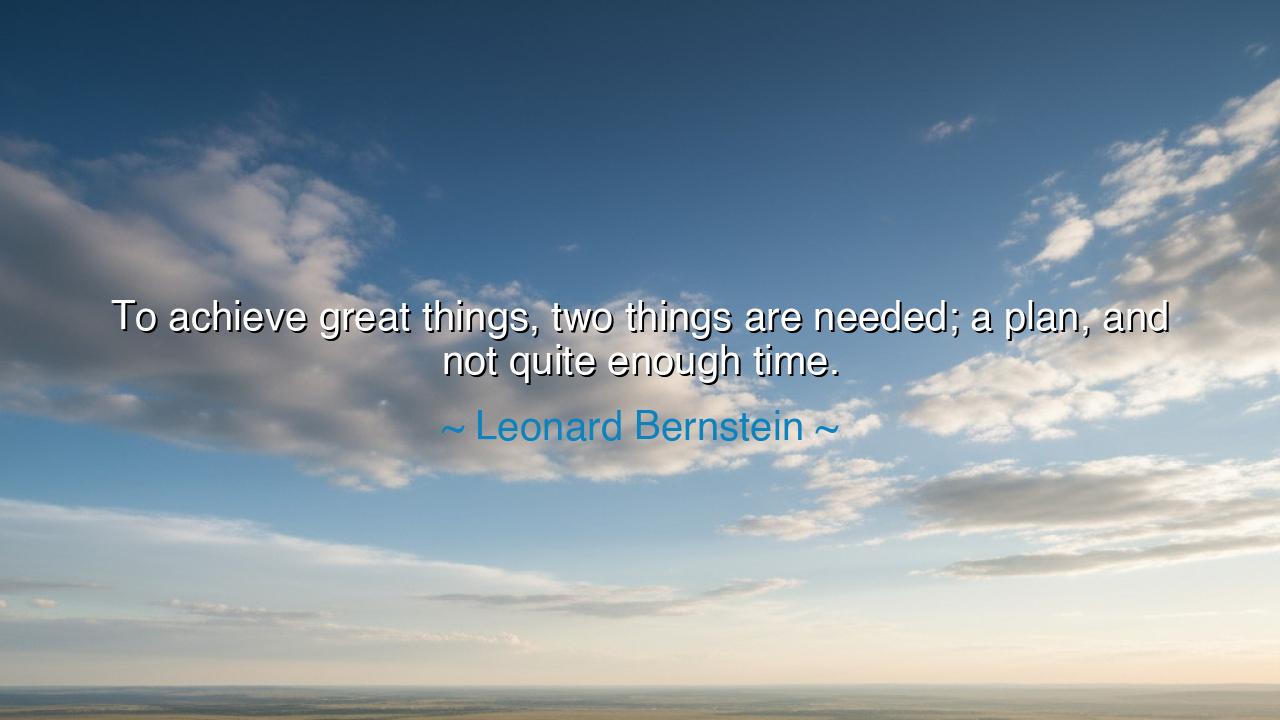
To achieve great things, two things are needed; a plan, and not






“To achieve great things, two things are needed; a plan, and not quite enough time.” — Leonard Bernstein.
Thus spoke Leonard Bernstein, the maestro whose music carried the pulse of genius and the wisdom of urgency. In these few words, he revealed a paradox that has stirred the hearts of creators, thinkers, and dreamers throughout the ages — that greatness is born not in comfort, but in the tension between order and chaos, between planning and pressure. He reminds us that to do great things, one must have both vision and fire: the structure to aim high, and the restless urgency that refuses to wait. For the clock, ticking ever louder, awakens in the soul the force that perfection alone cannot summon.
The origin of this quote comes from Bernstein’s reflections on creativity and human potential. As a composer, conductor, and teacher, he understood the strange alchemy that turns thought into art. He knew that a plan — the disciplined sketch of intention — was necessary to direct the energy of imagination. Yet he also knew that when time stretches too long, inspiration cools and the fire fades. Thus, he embraced the impossible rhythm of creation: to plan with care, but to live as though time were running out. In that crucible of urgency, he found his genius — for it is in the press of not quite enough time that the mind and spirit burn brightest.
The ancients, too, understood this truth, though they spoke it in different words. Homer’s heroes did not rise from ease, but from peril. The builder does not raise a temple in eternity; he raises it under the threat of storm. When the moment is fleeting and the goal immense, a strange strength awakens within us — the strength to overcome doubt, to silence hesitation, to act with clarity. Even the great sculptor Michelangelo, when asked how he achieved such marvels in marble, replied, “I saw the angel in the stone and carved until I set him free.” He worked not with endless time, but under the command of deadlines, patrons, and exhaustion — and in that tension, he found transcendence.
Bernstein’s wisdom also speaks to the nature of human motivation. Too much time breeds hesitation; too little, and we act with urgency. The heart of the matter lies in balance — enough structure to guide our path, and enough pressure to make us move. When we feel that “not quite enough time” remains, procrastination gives way to purpose. Every breath, every beat of the clock becomes a drum of destiny. The mind sharpens, the will strengthens, and fear transforms into focus. In this way, the scarcity of time becomes not a curse, but a gift of awakening — the divine reminder that every moment matters.
Consider the story of the Apollo 11 mission, when humanity set its eyes upon the moon. There was a plan — intricate, scientific, magnificent. Yet there was also urgency — a race against time, against failure, against the limits of knowledge itself. When President John F. Kennedy declared, “We choose to go to the moon… not because it is easy, but because it is hard,” he was invoking the same principle Bernstein described. The plan gave direction; the pressure gave power. And so, with “not quite enough time,” mankind transcended the earth. The glory of that moment — Armstrong’s step upon the lunar dust — was born from the marriage of preparation and pressure, vision and urgency, thought and time’s shadow.
In truth, all of life follows this rhythm. The student who writes through the night, the artist racing to finish before the curtain rises, the parent striving to provide before the years slip away — each lives the wisdom of Bernstein’s words. The plan gives them purpose; the lack of time gives them strength. For when time grows short, clarity dawns — we see what matters most, and pour ourselves into it without hesitation. The greatness we achieve is not despite our limitations, but because of them.
So let this be the teaching passed down through generations: Do not curse the clock — use it. Let the ticking of time remind you that creation waits for no one. Make your plan with care, but do not wait for the perfect hour to begin. Perfection lies not in endless preparation, but in courageous execution. When you feel the pressure of “not quite enough time,” remember that it is the same pressure that forged the world’s greatest works, the same urgency that has propelled every breakthrough of the human spirit.
Thus, as Leonard Bernstein taught, to achieve great things, we need both the wisdom of the planner and the daring of the doer. One gives direction; the other gives fire. Embrace both — for it is only when the plan meets the heartbeat of urgency that destiny is born. Let your time be short enough to burn, your purpose clear enough to endure, and your courage great enough to act — for in that sacred balance lies the music of creation itself.






AAdministratorAdministrator
Welcome, honored guests. Please leave a comment, we will respond soon